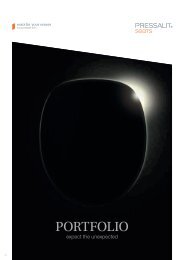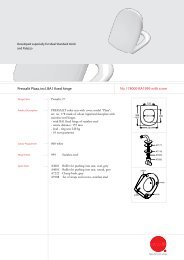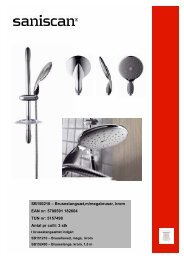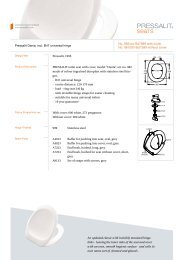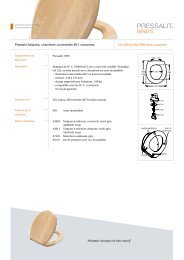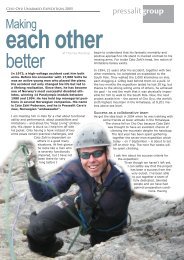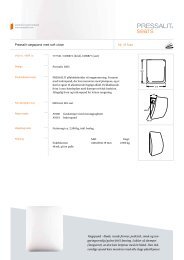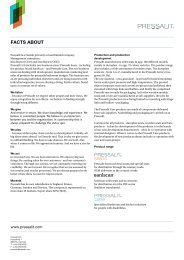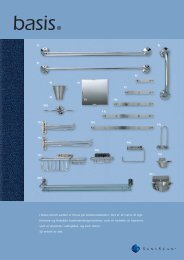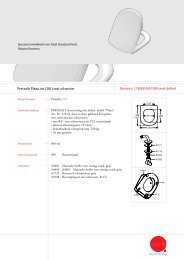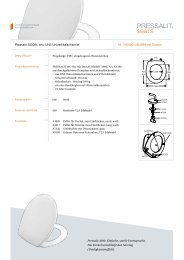Create successful ePaper yourself
Turn your PDF publications into a flip-book with our unique Google optimized e-Paper software.
NINA<br />
SMITH<br />
NINA SMITH (b. 1955) is a professor<br />
at the National Economic<br />
Institute at Aarhus University<br />
and a former economic adviser<br />
to the Danish government.<br />
From 2007-2009 she was also<br />
Vice-Chancellor for Academic<br />
Studies at Aarhus University.<br />
She is the author of several scientific<br />
articles in international<br />
publications and books and is<br />
an active lecturer on economics,<br />
the labour market, equality and<br />
social politics.<br />
Nina Smith served on the Danish<br />
Government’s Social Commission,<br />
the Danish Government’s<br />
Research Commission, the<br />
Danish Government’s Welfare<br />
Commission and the Danish<br />
Globalisation Council. She is<br />
and has been a member of several<br />
Danish boards.<br />
Nina Smith has been honoured<br />
with several distinctions for her<br />
work, including the prize DI’s<br />
Æreshåndværker, the prize Den<br />
Berlingske Fonds Hæderspris<br />
and Knight of the Order of<br />
Dannebrog.<br />
aware that there won’t be many unskilled jobs left<br />
as the jobs of the future will demand specific<br />
skills training. That is why it is so important that<br />
we, as a society, offer people an education. Unless<br />
of course we decide to take on the role of the<br />
people the Chinese outsource jobs to.<br />
DB I actually think that the crisis has made us a<br />
lot sharper. We are a well-consolidated company,<br />
but even well-consolidated companies can find<br />
themselves in trouble in the current situation. We<br />
are fortunate in having a competent team of staff<br />
who has ensured that our stock has been<br />
reduced so we could maintain high liquidity.<br />
NS Liquidity is something that enables a company<br />
to survive. It is important that a company survives<br />
the crisis with a strong business foundation. The<br />
companies with strong liquidity will be able to exploit<br />
their position when the markets recover. And<br />
this is already happening in Asia. China is once<br />
again experiencing growth of 9-10%, so they<br />
probably don’t have the same perception of the<br />
crisis right now as we do in the West.<br />
DB Do Danish companies have a real sense of<br />
how quickly the Chinese economy will explode?<br />
NS Yes, I think we’re relatively good at predicting<br />
trends. When we carry out analyses of globalisation<br />
readiness, we see that Denmark is well placed.<br />
As children we learned in school that Denmark<br />
neither has precious minerals nor other natural<br />
resources, but that we have the ability to think<br />
innovatively. And we have always been good at<br />
adapting relatively quickly. Unfortunately, Denmark<br />
has just experienced ten years with a low increase<br />
in productivity, and our competitiveness has seriously<br />
suffered as a result. This was made very<br />
apparent by the recent crisis, especially in Danish<br />
industry. So the next step is that we increasingly<br />
use globalisation to learn more from others.<br />
DB How?<br />
NS We need to adopt a slightly humbler approach.<br />
We think we have the best labour market,<br />
the best healthcare system, the best school<br />
system etc. Until we find out that isn’t quite<br />
the case.<br />
DB That’s a typical “small country” phenomenon.<br />
We are wrapped in cotton wool and easily lulled<br />
into a false sense of security. But the next generation<br />
will probably have an easier time of it as<br />
they are more global in their outlook than we are.<br />
The young students we take in have a completely<br />
different outlook than the older ones. We also<br />
need to be better in ensuring diversity when we<br />
recruit. It’s healthy for our culture to be challenged<br />
by new perspectives, ideas and competencies.<br />
NS You often hear that we educate<br />
too many human and social<br />
science graduates. But<br />
many of those with untraditional<br />
educations have skills which we<br />
also need to drive development<br />
and momentum. We know from<br />
our research that manufacturing<br />
based on user-driven innovation,<br />
as is the case at <strong>Pressalit</strong>,<br />
requires people who think<br />
differently.<br />
Maintaining a broad outlook<br />
DB I think it’s important to maintain<br />
a broad outlook, also in<br />
times of crises. That companies<br />
continue to take students in and<br />
maintain dialogue with educational<br />
institutions.<br />
NS Right now it isn’t particularly<br />
easy for students to find practical<br />
training. This applies to foreign<br />
students in particular, and<br />
this really is shameful. Being<br />
able to draw on a student with a<br />
different cultural background<br />
who is familiar with the markets<br />
in which the company operates<br />
is a fantastic resource.<br />
DB I’m surprised because we<br />
try to encourage foreign students<br />
to apply for practical job<br />
training at <strong>Pressalit</strong>, and we are<br />
disappointed not to receive more<br />
applications from students with<br />
a non-Danish ethnic background.<br />
But what do you do to<br />
promote dialogue with the business<br />
community?<br />
NS The universities are doing a<br />
lot to reach out to the business<br />
community and make a practical<br />
contribution. The time when<br />
researchers locked themselves<br />
away in ivory towers is long<br />
since gone. Today what really<br />
counts is establishing successful<br />
collaboration with the corporate<br />
sector. This is where I feel<br />
like passing the buck back to<br />
the Danish companies. They<br />
also have to be willing to invest<br />
in collaboration and dialogue<br />
with us and to exploit the universities’<br />
knowledge.<br />
DB Closer collaboration with<br />
the corporate sector would also<br />
result in a clearer focus?



